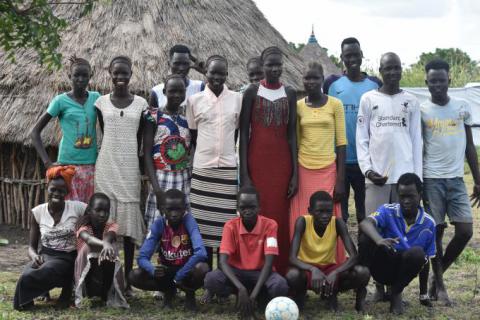Providing safe and uninterrupted education to conflict affected children
Akobo, South Sudan - Boys and girls between the ages of 14 – 18 years (and their caregivers), have experienced various forms of hardship and distressing event, including armed cattle raiding, family violence, poverty, community unrest and conflict emergencies. The conflict and displacements disrupted the education systems and destroyed school infrastructures. In addition, the government salary earmarked for the teachers often delays and as a result, most teachers have little or no pay at the end of the month after their services. Many teachers fled the area in search for better jobs and others for their safety leaving the future of children in the area at stall. The economic crisis and inflation due to the conflict has made it hard for parents to send their children to school because they cannot afford scholastic materials such as clothes, books, pens and sanitary pads for girls to stay in school.
In an effort to end violence among the youth, Save the Children supports and establishes youth recreational points. Youths and community members also receive resilience workshops and term psychosocial support to live a life that benefits the community instead of involving in cattle raiding, earlier marriage and community violence. The program contributed to reduced criminal and unlawful activities among youths in the areas.
To make schools function for the future of children, Save the Children stepped up to train teachers, give them incentives to cover the small and delayed salary they receive from the government. Save the Children distributes scholastic materials, books, pens and pads to the children so they can stay in school. In Akobo boys’ primary school, over 2000 children receive the support to continue with the education. About 1000 girls at Akobo girls’ primary school have been supported to remain in school.
Machol*, 16
“I do not want to stay with those who participate in criminal activities. But instead giving advise to my colleagues e.g. not to do raiding and to get married at early stage. As of what we were taught in youth and child resilience program I will use them as an opportunity to give change to my friends in the community, thank you”
Joan*, 15
“In 2013, I fled with my sisters to the UN Protection of Civilian site to seek for safety when fighting broke out in Malakal”. While is Malakal, I found it staying without my mother was hard. If you want immediate help like basic needs, pads, you can’t get. I have to find my way to look for my mother until I reached my mother in Akobo. I have to enroll in school and now in primary 7. Save the children gives me scholastic materials, books, pens and sanitary pads to support my education. I want to become a doctor after studying”.
Gatluak*, 38, Chief Akobo Mission Area.
“We do advise youth to stop this kind of life like revenge killing/clan clashes. So this is our common stand in this community as local chiefs that youth should stop killings but should come to school life for death is not helpful in this community. Up to now is like they have heard about the information/awareness we gave them. We are praying that may be God will help us with this sign of peace and should remain as it is today and so we can also help them in their life. As for you Save the Children, we are happy that you joined in so that you can show us the way in which we can handle this Youth because we cannot handle them with our bare hand”
Save the Children in Akobo Jonglei State with support from DANIDA and in partnership with county education department State Ministry of Education in Jonglei has been implementing a project entitled South Sudan improved access to quality, protective learning and child protection services for displaced and conflict affected children. The estimated project target is around 2,587 and around 75% of the total target has so far been reached.
 South Sudan
South Sudan 